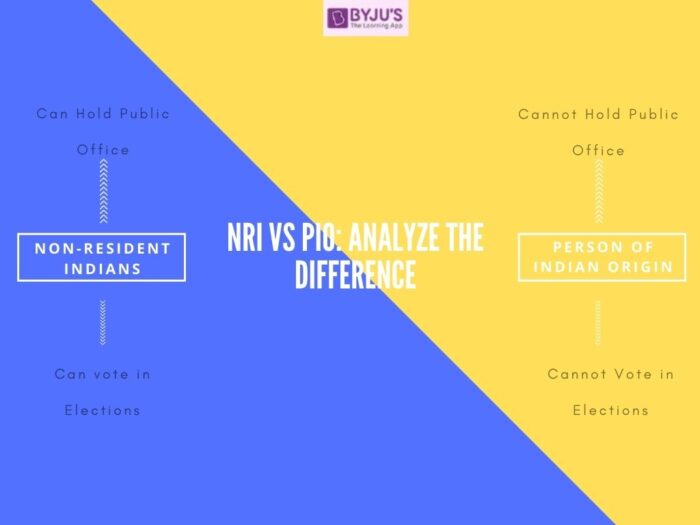The terms Non-Resident Indian (NRI) and Person of Indian Origin (PIO) are used to describe individuals of Indian birth or descent who live outside the republic of India
Despite this commonality between them, the two terms are fundamentally different from one another.
An NRI is an Indian who is a resident in a foreign country.
A Person of Indian Origin is a designation assigned to foreign nationals with the exceptions of those belonging to Pakistan, Afghanistan, Bangladesh, China, Iran, Bhutan, Sri Lanka and Nepal.
For more 100 Difference Between Articles, visit the linked article.

This article will further highlight the difference between an NRI and a PIO within the context of the IAS Exam.
Difference Between Non Resident Indian and Person of Indian Origin
| Non Resident Indian (NRI) | Person of Indian Origin (PIO) |
| Non-Resident Indian are referred to as Indian Diaspora, are the people of Indian birth or descent living outside the Republic of India.
|
The Persons of Indian Origin are also referred to as Overseas Indians.
The following criteria needs to fulfilled for a PIO designation:
|
| As per the data by the Ministry of External Affairs there are about 30.8 million NRIs outside India. | Roughly the population of PIO is the same as NRIs or thought to be slightly higher than NRIs |
| To qualify as a resident Indian, an individual should have spent 182 days or more of a financial year in India, or stayed in India for 60 days or more in the year and for a period of 365 days or more in the 4 years preceding the relevant financial year |
|
| NRIs enjoy voting rights in India | PIO Card holders do not have voting rights in India |
| NRIs are eligible for public offices | PIO card holders are ineligible to hold public office in India |
| NRIs need not to take permission visit restricted places in India | PIO card holders need to take permission from the Foreigner Regional Registration Office visit restricted places in India |
For further readings candidates can refer to the following articles:
Difference Between NRI and PIO:- Download PDF Here
FAQ about Non-Resident Indian (NRI) and Person of Indian Origin (PIO)
What are the benefits of a Person of Indian Origin (PIO) cardholder?
What is Know Goa Programme (KGP)?
Aspirants can find the complete UPSC Syllabus through the linked article. More exam-related preparation materials will be found through the links given below
Related Links
Comments